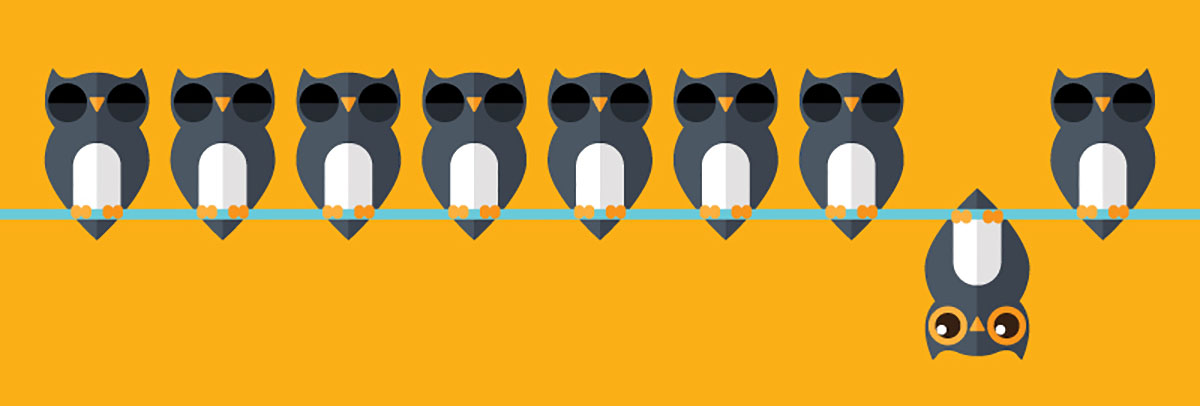Covid-19 pandemic: one year on
It’s been nearly one year since the majority of students, staff and faculty at the University of Alberta have stepped foot on campus. Due to the COVID-19 pandemic, on March 14, 2020, the University made the decision to require faculty and staff to work from home and transition all in-person classes and exams to remote delivery — all in three days.
The adjustments have undoubtedly strained our emotional, physical and mental well-being. For some, it’s been twelve months of working and living in isolation. Many first-year students have yet to even sit in a classroom. Those who have graduated were unable to walk the stage to celebrate their hard work and dedication.
We reached out to four Alberta School of Business faculty members for their own experiences and perspectives in a year unlike any other: Erin Marshall is an accounting professor who has been innovative in the transition to remote learning; Leo Wong, associate dean of the undergraduate office, has worked with students to find ways of connecting online; Trish Reay, associate dean of PhD and research, has worked with international students currently living around the world; and Joseph Doucet, dean of the Alberta School of Business, has been instrumental in fostering an environment for innovation, connection and collaboration.
Although the School was quick to adjust to the virtual environment, it’s still not clear how these changes will play out long-term. Here’s some of what these four individuals have learned from a year of adversity, resilience and growth.

Prioritize our health.
We hear it time and again — prioritizing our mental, emotional and physical health is paramount to maintaining a sense of well-being. But do we actually take those suggestions to heart?
Build daily habits. “Habits can be very powerful,” said Erin Marshall. Whether that’s a ten-minute meditation, a morning yoga sequence, an afternoon coffee break or a lunchtime podcast, having something to look forward to each day can help you reset and offer an escape from the daily grind. And learn new skills — but only if you want to. Surviving the pandemic is not one-size-fits-all.
Get outside. Even if it’s just for five minutes every day, Trish Reay stresses the importance of walking away from the computer for some fresh air. “Outside matters a lot,” said Reay, though she recognizes how fortunate she is to live somewhere that supports that routine.
Limit your work hours. While working from home has its benefits — hello loungewear — there are definite drawbacks; it seems harder than ever to walk away from our phones and computer screens. Marshall stresses the importance of work/life balance and dedicating a predetermined set of hours for work. Not only will this practice help recharge your batteries, it’ll make you more productive during your work hours.
Maintain connections. As associate dean of the PhD program, many of Reay’s students are international and have been away from their families for long periods of time. Others have yet to relocate to Edmonton and have the added challenge of different time zones — they’re often required to work through the night. Their ability to have social events and gatherings with their peers is an important part of how they thrive, and “suddenly, they’re left without that,” said Reay.
“I know it’s been really difficult for some of them so the question is, ‘what do we try to do to help?’”
While impossible to completely replace the social, emotional and mental health benefits of meeting face-to-face, the School has been working to provide opportunities for students, faculty and staff to feel less isolated and alone.
Reay is meeting much more frequently with students and is encouraging them to have buddies and help each other as much as possible. And some PhD students are currently immersed in research, which may make the situation easier.
But she knows there are no easy answers when it comes to delivering an online program that meets all the social and educational needs of students.
Learn to adapt. The work-from-home order was well underway by the time Leo Wong started his new role as the associate dean of undergraduate students; because of that, he was able to bring a unique perspective to some of the challenges facing students for whom socialization is a key part of the university experience.
“The students are trying to do the right thing by staying at home and not socializing in person, but all of that is amounting to a tremendous amount of isolation and mental anxiety,” said Wong, who’s heartened seeing the creative ways in which students are connecting with one another.
For example, the students have launched weekly game nights on Zoom and other online platforms and have established peer groups in order to connect and check-in with their cohorts.
Empathy, honesty and understanding. In addition to the global pandemic response, 2020 saw major calls to action in terms of social justice, inequity and the global warming crisis. Dean Joseph Doucet stresses the importance of establishing and maintaining a channel for open and honest communication among your friends, family and peer groups and making an effort to be empathetic and understanding to everyone’s unique situation.
“It’s okay to not be okay right now,” said Doucet. “Everybody is struggling in their own way so remember to ask for help when you need it.”
Marshall also added that it’s important to be comfortable addressing the issues and challenges in course materials, classroom discussions and conversations with peers.

Our School’s response
When the pandemic shut down the University last year, the School of Business needed to quickly reevaluate many of its processes to continue to effectively support its students, staff and faculty in a remote environment.
Faculty had to convert their course materials for online delivery, students had to motivate themselves to work, learn and study without the support of in-person learning, study groups and classroom discussions and staff had to help coordinate programs and initiatives for a virtual delivery.
Though decisions were made in the short-term out of necessity, the School is constantly adapting in order to provide students with a memorable and worthwhile university experience.
“I’m very proud of the entrepreneurial spirit and innovation demonstrated by everyone in dealing with the pivot to working from home and distance delivery,” said Doucet.
Innovation with classroom delivery. Marshall has taught the same class for years and had materials and discussion topics tailored for in-person discussion. Part of the challenge with remote delivery was figuring out a way to “keep the bones of the material the same” while adapting to online.
Marshall was an early adopter of using breakout rooms in Zoom, a method where students can work in groups to complete exercises and cases, and mandating the use of video for class attendance, which helped keep the class environment real and more personal.
Last spring, she was also a part of a committee that created an e-learning website with information and resources for instructors in order to simplify ways of delivering online content, like how to use the camera and film content or how to effectively use chat rooms and different tools to innovate course delivery.
But there are still things to work out with virtual learning, like how to best coordinate different time zones, exam proctoring and the benefits of asynchronous versus synchronous course delivery.
Plus, determining how to enforce more consistency between classes, said Marshall, who has received feedback from students having a hard time with the different learning styles and delivery methods from class to class.
Creative connection. When Wong hired a group of students as Online Learning Assistants (OLA’s) last summer, he initially thought they’d help support instructors who were trying to find a way to deliver their courses online. Yet as their positions evolved, the OLA’s started to focus more on student engagement and were pivotal in launching BComUnity — an undergraduate initiative that recognizes students and staff for their hard work and resilience during an isolating year.
“One of the benefits of engaging directly with students is how they add so much colour and energy into the online world of the Alberta School of Business,” said Wong.
Doucet has also established new routines in an effort to maintain relationships by sending out weekly dean’s update emails and setting up regular one-on-one meetings with faculty and staff.
“One of the lessons I’ve learned this year is not only the need for constant communication but the importance of clarity in our messaging,” said Doucet.
And because people really care about the outcome of the School’s pandemic response, Reay too said she has seen the benefit of regular Zoom meetings in increasing collaboration and communication among the School’s leadership team.

Lessons moving forward
As we move towards pandemic recovery, it’s safe to anticipate that learning and working from home will continue in some capacity — at least for the foreseeable future.
Though the School has made a conscious effort to maintain some sense of normalcy for students, faculty and staff, there’s still a need to address some of the ongoing challenges.
All four faculty members stressed the need for doing more for mental health and wellness for students and staff, whether that’s providing more wellness events or thinking of different ways to deliver courses to reduce student anxiety and account for isolation challenges and time zone differences.
And even though we’re moving towards recovery, they all say it’s important that we not go back to how it was, but instead carry forward some of the lessons learned to create an even better learning and working environment.
For Marshall, that means being grateful, tolerant, kind and open to change.
“This year has helped me put things into perspective,” said Marshall. “What do I want to think about when I look back on this time? I’d rather think that I grew as a professional and as a parent versus thinking about all the negatives.”
For Reay, it’s about not taking for granted the opportunities to connect and communicate with her students face-to-face.
“Maybe it’s a good thing that we haven’t figured out all the missing pieces in this remote environment, because it shows the value of what an in-person program can do for students.”
Wong hopes some of the creative and engaging methods and ideas we’ve learned and benefit from with virtual delivery will stick, like no longer requiring students to sit in a room for long periods of time. He’s also more committed than ever to working closely with students when addressing some of the persistent challenges in the world.
“The biggest asset that we have with our students is that they are young, ambitious and think creatively,” said Wong. “The energy and vision that our students can bring to these issues will hopefully reduce — and eventually eliminate — some of the social and environmental challenges we face.”
And for Doucet, the focus is on not just adapting but on trying to build on what we’re learning now in order to do a better job in the future.
“My hope is that a student who enters the School in two years will have an even better learning experience had we not gone through the pandemic.”